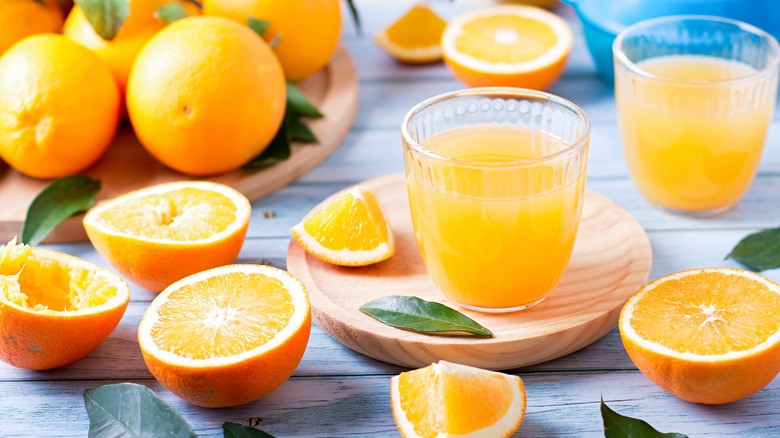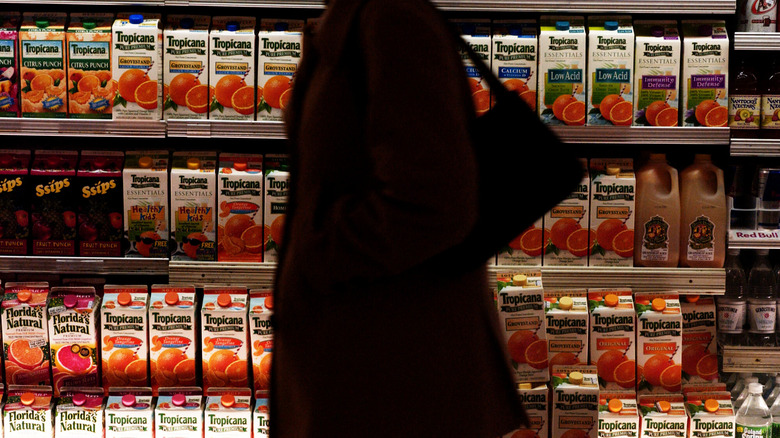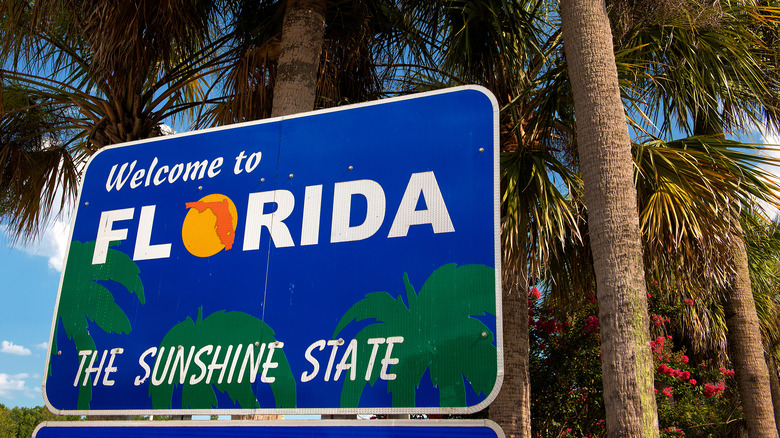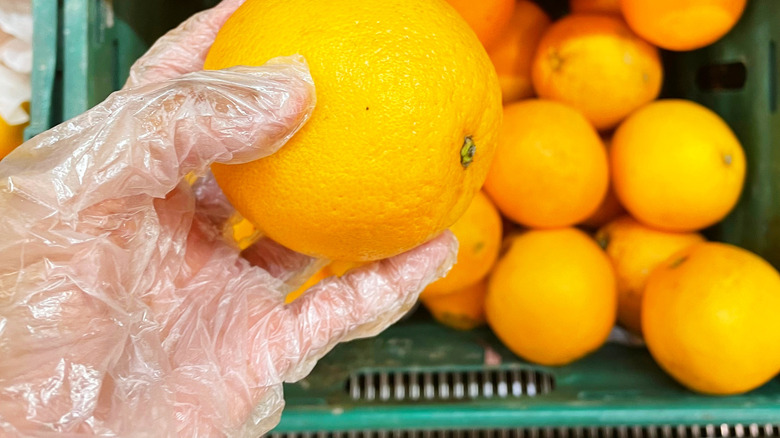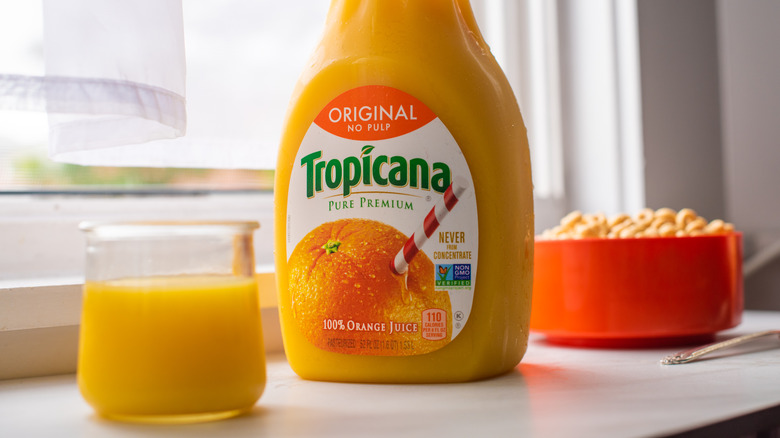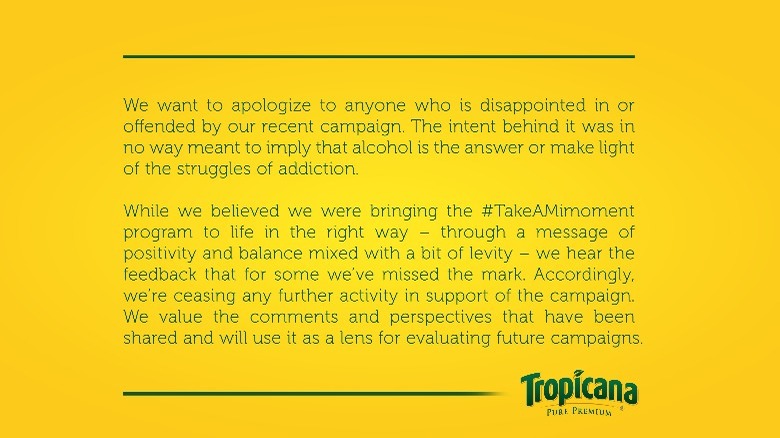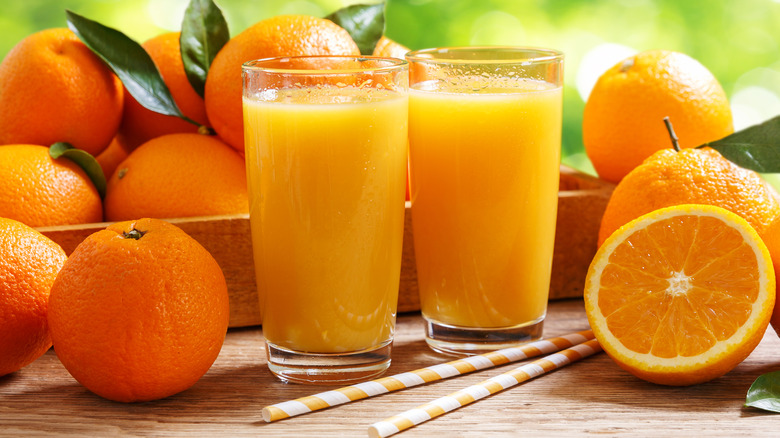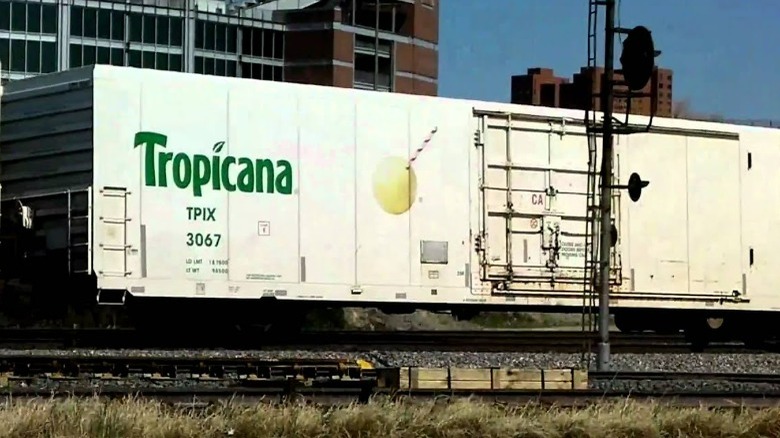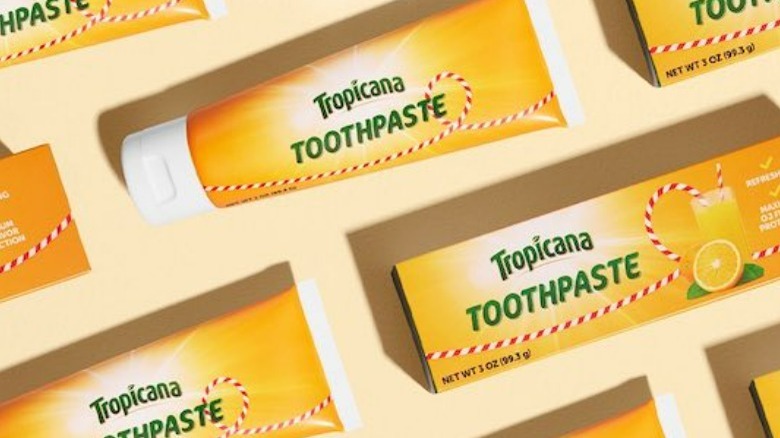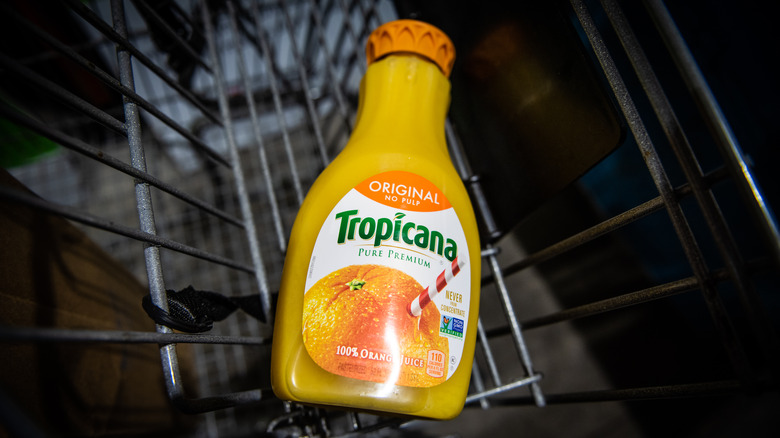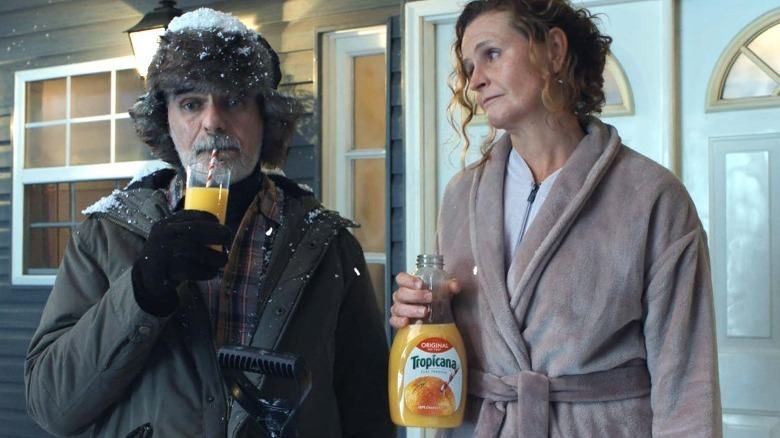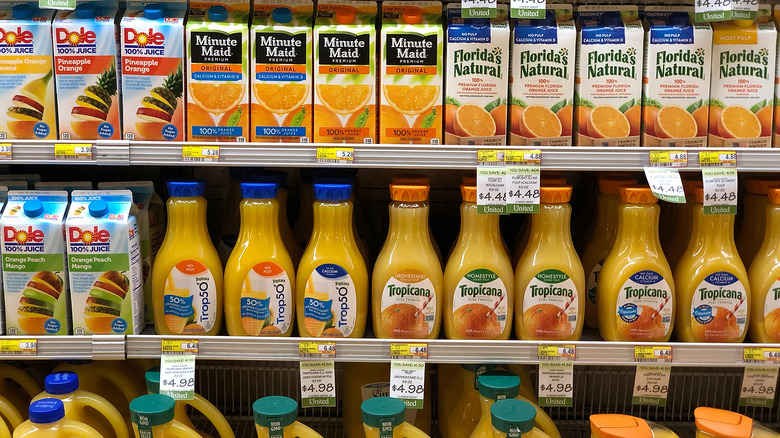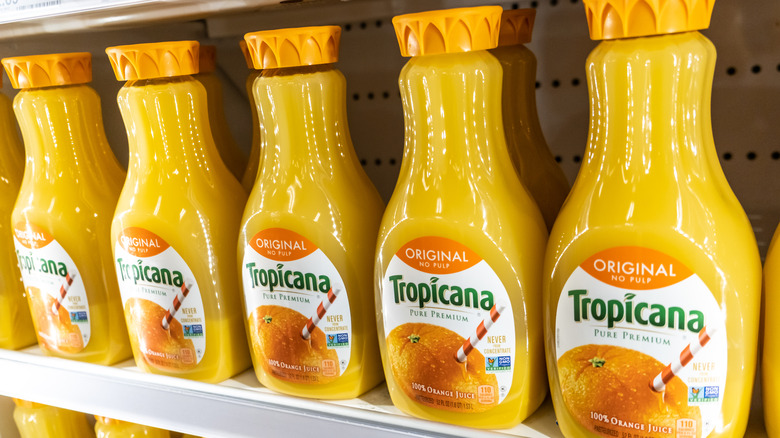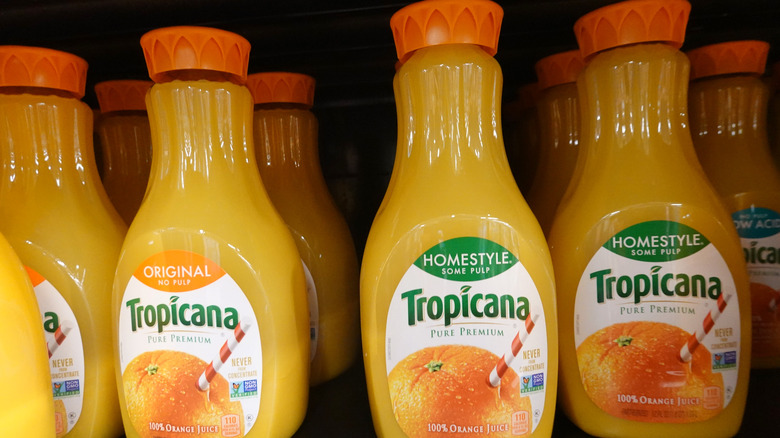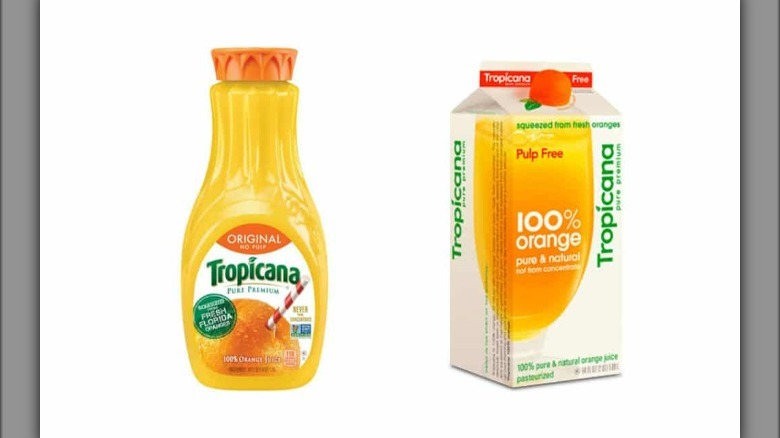The Untold Truth Of Tropicana Orange Juice
We may receive a commission on purchases made from links.
When you're putting together your breakfast, what's better to pair your bowl of cereal with than a cold glass of orange juice? The citrus-y fresh drink is perfect not just for breakfast, but for any time of day as a satisfyingly fruity beverage. Aside from being high in vitamin C, orange juice also has numerous health benefits, such as the high levels of antioxidants in a single serving of the drink, according to Healthline. While the same site warns against orange juices that contain higher servings of added sugar, there are many reasons to try to incorporate pure orange juice, which doesn't have as many unnatural ingredients included, into your diet.
There are loads of orange juice brands across the country, such as Minute Maid and Simply Orange, though perhaps one of the most well-known of these juice producers is Tropicana. According to Statista, as of 2021, the brand is the leading orange juice producer in the United States, so when we say that Tropicana's juice is great, the numbers are there to back that claim up. Whether you plan on using orange juice with your breakfast, for ice pops, or for any recipe that needs orange juice, using Tropicana is never a bad decision. The Tropicana brand isn't just thirst-quenching, though. There's a lot you might not know about this orange juice company, so here are the untold truths of Tropicana Orange Juice.
The Tropicana brand has sold their orange juice since 1947
The Tropicana brand has been around for a long time now, and it's difficult to remember a time when the orange juice company didn't have the claim as one of the best producers of the citrus-y beverage. According to the official history page of the orange juice, Tropicana has been around since 1947, meaning that the brand has been around for around 75 years now. This makes it younger than both Minute Maid and the Florida's Natural brands (having been founded in 1945 and 1933 respectively), so even though it's been around for almost all of our lifetimes, it's still relatively new compared to other companies — which makes Tropicana's rise to the top all the more impressive.
Tropicana was founded by Italian Anthony T. Rossi, who came to the U.S. with only $25 and established what would grow to become one of the biggest orange juice brands in the country (per Tropicana). The man helped implement the well-known "Juice Train," as well as assisted in further developments in flash pasteurization, which refers to the process of getting rid of harmful microorganisms and substances in a beverage, making it a lot safer for consumption (via Techniblend). Even after the founder's death, the company continues to uphold Rossi's standard to offer safe and delicious orange juice.
Tropicana is the #1 buyer of Florida oranges
Even if you've never had a glass of orange juice yourself, it's pretty common knowledge that orange juice is primarily made out of oranges. The citrus fruit is in season from fall to spring (via PureWow) and often found in kids lunches as an easy fruit to pack. They're grown in many different areas around the world, though in the United States, they are grown by the masses in Florida. According to Oranges.com, oranges have been grown in Florida for a long time, dating back to the 16th century. Furthermore, the website claims that over "90% of the orange juice Americans currently drink is produced in the Sunshine State."
Like Florida's Natural, Tropicana gets the oranges they use for their orange juice primarily from Florida. In fact, the brand's website claims that Tropicana buys up one-third of all of the oranges grown in the southern state, and that it is also the top purchaser of the citrus fruit. The company also uses oranges grown in Brazil, though its primary source of the fruit is the Sunshine State. Considering the fact that Tropicana buys more oranges from Florida than an orange juice producer that has the state in its name, you know that Tropicana isn't skimping when it comes to finding good oranges.
The oranges Tropicana uses for their juice are hand-graded
Let's get this out of the way: oranges, tangerines, and mandarins of any kind all require a bit more effort to eat than your typical fruit. It's true that you don't necessarily have to slice it open like a pineapple or pomegranate, but compared to the ease of washing strawberries and grapes and popping them into your mouth, oranges need a little more work to get to the actual fruit.
Because of the brightly colored skin, you don't have to put the fruit in a bag to take to work or school. However, you do need longer nails or a bit of force to peel oranges, and then you have to worry about the pith, which is more work if you don't want to eat that.
Not only that, but it's also a bit more difficult to tell whether or not your orange is bad, since the actual fruit is underneath the skin. And bad oranges would mean bad orange juice. Fortunately, Tropicana claims to hand-grade their oranges, and puts them under high scrutiny. According to Vemco, "..any fruit that doesn't meet our stringent standards is removed." All of the good oranges are then washed, and the fruit is "gently squeezed" for the juice, while the skin is used for orange oil, which helps with the juice's quality and flavor.
Tropicana is filled with loads of sugar, but also healthy vitamins
Most fruit juices are loaded with extra sugars. This makes for incredibly sweet beverages, but not the most healthy drinks. In fact, many juices are loaded with almost as much sugar as a carbonated soda, like Dr. Pepper or Fanta. These aren't exactly known as healthy drinks to have on a daily basis, making it all the more important to know exactly what is going into the juices you buy. Fortunately, there are loads of juices that are healthy, not just because they only contain natural sugars, but also thanks to the health benefits they offer.
One glass of Tropicana does contain a lot of sugar: 22 grams, to be exact (via Livestrong.com). But upon closer inspection, you'll notice that none of it is added sugar. Lots of sugar isn't good for you, regardless of where it comes from, but it is important to get a certain amount of sugar in your weekly diet, so orange juice is a perfect candidate.
Furthermore, the Tropicana company showcases the many nutrients and vitamins that the orange juice contains, such as Vitamin E, Folate, and Niacin, to list a few. Although, when it comes to sugar, orange juice isn't as inherently healthy as a simple glass of water, Tropicana's orange juice does provide a lot of important vitamins that can keep you healthy.
Their Mimosa recipe has undergone a bit of controversy
Though fruity alcoholic beverages are nothing new, mixing some orange juice into your next cocktail might not be something that you'd normally think of doing, especially when compared to other citruses, such as lemon or lime. However, oranges add a sweet, fruity note to any drink that's just as flavorful as other citrus drinks. We don't suggest having an orange-flavored alcohol drink for breakfast, but many people would enjoy having an orange-flavored whiskey on a warm summer evening.
While cocktails and orange juice are delicious, they aren't the solution to all of our problems. Back during the height of the pandemic, the Tropicana brand released a social media post that strongly suggested that mimosas with their juice mixed into it could help parents cope with the stress of COVID-19.
According to FOX 8, "Some Twitter users were offended by the ad and pointed out that drinking in secret away from your family is not a healthy way to cope with the stress of the pandemic." With a decent number of disapproving Twitter users, the company released an apology for the ad campaign, stating that they value the perspectives of those who were offended by the ads.
The 100% Orange Juice might not actually be 100% pure
Pure, delicious orange juice is the name of the game, and since orange juice typically has a lot of natural sugars, vitamins, and nutrients on its own, you shouldn't have to add too much to the juice to make a satisfying citrus beverage. Tropicana prides itself on its orange juice consisting of one prime ingredient: pure pasteurized orange juice. Looking at the listed ingredients on Amazon also shows that the juice contains calcium hydroxide, vitamin D3, citric acid, and malic acid, but there's nothing else, making the ingredients list extremely short compared to other products. While the ingredient list is short, how those ingredients have been used hasn't been all that pure.
To keep the taste of their orange juice the same in each bottle, Tropicana squeezes their oranges, then removes any extra oxygen from them (per Mel Magazine). By removing the oxygen, many of the natural, delicious flavors that are found in the orange juice were removed, leading the company to add artificial flavoring. This has caused many people to be upset with the orange juice company for "false advertising," and even has led to some legal cases being brought up in courts (via Reuters.com). Though the process is done to give the orange juice a longer shelf-life, we'd rather Tropicana be upfront about its processes instead of trying to hide it under their "100% natural" branding.
Trains are a huge part of the Tropicana business
When you want to get somewhere fast, some of the fastest methods of transport across long stretches of land are by plane, car, and train. Trains have been around for a while now, and the first steam engines were introduced to the country in the 1800s (via PSC). Trains have been used to ship a large variety of materials, allowing them to get from place to place faster and in greater amounts. It did, however, take a while before certain food products were transported by this method. Through the Tropicana brand, Anthony Rossi not only revolutionized flash pasteurization, but changed the way that orange juice would be shipped forever.
Before the 1970s, Rossi's orange juice company got its beverages to customers by slow delivery services, and eventually, by boat (per VRE). However, as the demand for this product grew, Rossi realized that if he wanted to deliver high-quality orange juice across the country, his methods would need to become faster. According to VRE, the Great White Juice Train first "commenced service over the 1,250-mile route" in 1971. This juice train still runs along the tracks today, and you might see it pass through your neighborhood or city on its way to deliver more orange juice.
Tropicana created an Orange Juice Toothpaste
It's important to brush your teeth, but if you want to have a bottle of Fanta, or eat something sweet, then the minty fresh toothpaste taste in your mouth will likely ruin the experience. Perhaps the worst offender of this situation is orange juice. If you brush your teeth after you have breakfast and then feel like going back for a second glass of OJ, then you'll be met with an extremely bitter, citrusy taste in your mouth, not at all like a sweet glass of orange juice. Luckily, Tropicana thinks that they've found a way to solve the toothpaste and orange juice dilemma with a toothpaste of their very own.
Back in 2021, Tropicana released a toothpaste that would supposedly not make orange juice taste completely bitter after trying it. According to Food & Wine, the Tropicana company worked closely with "Dynamic Blending Specialists" to create the toothpaste without sodium lauryl sulfate, which is the primary cause of bitter-tasting orange juice. This toothpaste was not widely available in stores, but upon its initial release, Tropicana gave the toothpaste out to people who commented on the brand's Instagram page. Though this toothpaste was a limited edition offering, it could pave the way for future toothpastes that won't ruin your snack breaks.
Tropicana is to be owned by PAI partners
Popular beverage companies that come to mind are brands such as Pepsi and Coca-Cola. PepsiCo is the soft drink company behind the popular drinks of Lipton, Gatorade, and of course, Pepsi. They also carry Doritos and Lays, and for the longest time, the Tropicana name was also owned by PepsiCo.
Pretty recently, however, there was a change in ownership of the well-known orange juice brand's name. This change is so recent that if you go to the company's website, you'll actually still see the orange juice listed as one of the brands that they carry. However, PepsiCo sold the Tropicana brand in late 2021.
According to Fortune Daily, PepsiCo entered a deal with PAI Partners, in which they sold several of their juice brands for 3.3 billion dollars. PAI Partners will be backed by Korea Investment and Securities (per Korea Herald). Even though the owner of the juice brand is being transferred from PepsiCo, Tropicana's quality will hopefully remain the same, and still be an incredible breakfast drink.
Tropicana's ads feature some pretty hectic situations
In order to get their names out there, creative, engaging advertising is a must for even the largest of brands. While some ads attempt to put you in a serene, enticing mood, such as many cereal or breakfast food ads, other companies, such as Old Spice or Red Bull, will go in the opposite direction and create wild and occasionally confusing ads that will stick in your head hours after you see it. Both ads can yield successful results, though more recently, the Tropicana brand has begun to swing more towards trying to get a "confused and shocked" reaction towards its advertising.
In some of their recent ads and commercials, the characters are put through some pretty interesting scenarios. In one advertisement, a family is sitting down for breakfast when their table collapses. Luckily, their orange juices are in their hands, and they continue to drink. Another advertisement on the company's Twitter page has a ton of snow land on a man's head as he tries to shovel the front of his house, and he enjoys a glass of orange juice after the fact. It's clear that the goal of these ads is to deliver a message of Tropicana being good for any occasion, though it's unlikely our tables will randomly collapse while we're having breakfast.
Tropicana started the manufactured OJ fad, and are still going strong today
Thanks to their innovations in the transportation and production of oranges, Tropicana not only changed, but headed the start of manufactured orange juice production in the states. With the start of the juice train, and improvements in flash pasteurization, Tropicana improved an industry that hadn't seen such widespread success beforehand. Now, the brand works with 100 orange growers in over 500 groves, many of which are owned by family farms (via ABC News). In 2017, Tropicana shipped over two million bottles of orange juice across the U.S. every day, showing just how much it has grown since it first pioneered the industry. According to the article, "The processing plant operates 24 hours, seven days a week," and boasts 900 workers. In addition, Tropicana pays 2,000 to 2,500 people to pick oranges.
The plant at which the juice is processed can create about 2.5 million cartons a day, with an average of 48 million oranges picked and turned into juice daily. Tropicana's orange juice has managed to stay on grocery store shelves for decades. Though they weren't the first, we have Tropicana to thank for delicious and quickly manufactured orange juice.
Tropicana had recalled their drinks in the past
If you found dirt or mold in your sandwich or soda, you wouldn't want to finish it. Many food and beverage products have had to be recalled in the past due to a batch of said product being contaminated in some way. It's not something to get overly panicked over, and ditch a brand because one particular batch of their products may not have been fit for consumption.
There's also a variety of reasons a product can get recalled. While in some cases, it could be due to pesticides or the spread of a foodborne illness, in other cases, it's simply due to accidental mislabeling. Tropicana has also had to recall some of its products in the past.
Back in 2002, around 500 bottles of Tropicana's orange juice were contaminated with some sort of cleaning solution, and recalled after a consumer reported burning in her stomach (per Yourlawyer.com). Though these bottles were recalled, it was not the last time this happened to the company. In May of 2012, PepsiCo had to recall around 277 multipacks of Tropicana Kids orange juice due to possible contamination (via The Guardian). The drinks were supposedly affected by "microbiological contamination," and consumers who purchased any of the contaminated juice were urged to not drink it, and to call a freephone helpline for a refund.
Tropicana's containers have gotten smaller
When you go to a restaurant, there are some dishes that sound amazing, like a nice cut of steak, but when it comes out to you, you're met with a disappointing piece of meat the size of your thumb. To make things worse, you still have to pay $15 for it, even if you aren't satisfied. Even when you aren't going out for dinner, it's still disappointing to find that you've gotten less than what you thought you paid for, like finding out that the bag of chips you bought is half air inside. While it's not as obvious as what Lays or Pringles does with their snacks, Tropicana has cut back, as well.
The bottles in which Tropicana juice is sold have, like many other products, been shrinking in size. According to Mouseprint, you used to be able to get half a gallon of Tropicana's OJ, but in 2010, it was dropped down to 59 ounces, and again to 52 ounces in 2018. Consumers may not have noticed this at first, as on the surface, the bottles look pretty similar. However, when comparing the 59 and 52-ounce bottles, one would find that the 52-ounce bottle has less depth. When asked about why they did this, Tropicana released a response, claiming that "After recent natural events orange crop yields have declined, which has led to increased commodity prices. To offset this, we decreased our package size."
Tropicana's rebranding was a flop
When you're looking for something refreshing and new, the packaging of a product can make all of the difference. There's a multitude of different reasons why one would want to rebrand, though. For fast-food chains such as KFC, it may be because of a particular state name being trademarked, while for a syrup product such as Aunt Jemima, it could be to get rid of an offensive mascot or name. Or, it could be done just to make something appear more eye-catching. Tropicana has also attempted to rebrand its orange juice, but unlike KFC or other big names, it was unable to do so successfully.
Early in 2009, Tropicana redesigned the packaging on their orange juice, which instead of displaying a full orange, showed off a glass of the actual juice. While on the surface, it doesn't sound like any wild, offensive changes were made, for some reason, people were not happy with this change (per NPR News). Many were more familiar with the original graphic, and weren't excited to see something new. According to JM design, the president of Tropicana North America expressed that "What we didn't get was the passion this very loyal small group of consumers has." With that, the brand reverted to its original logo and design.
